Book contents
- Frontmatter
- Contents
- List of Contributors
- 1 Introduction
- 2 Teachers Unions in the United States: The Politics of Blocking
- 3 Teacher Unions in England: The End is Nigh?
- 4 Teacher Unionism in France: Making Fundamental Reform an Impossible Quest?
- 5 Teacher Unionism in Germany: Fragmented Competitors
- 6 Teachers Unions in the Nordic Countries: Solidarity and the Politics of Self- Interest
- 7 Teachers' Unions in Japan: The Frustration of Permanent Opposition
- 8 Teachers' Unions in Mexico: The Politics of Patronage
- 9 Teacher Unions in India: Diverse and Powerful
- 10 The Comparative Politics of Education: Teachers Unions and Education Systems Around the World
- Index
- References
1 - Introduction
Published online by Cambridge University Press: 22 December 2016
- Frontmatter
- Contents
- List of Contributors
- 1 Introduction
- 2 Teachers Unions in the United States: The Politics of Blocking
- 3 Teacher Unions in England: The End is Nigh?
- 4 Teacher Unionism in France: Making Fundamental Reform an Impossible Quest?
- 5 Teacher Unionism in Germany: Fragmented Competitors
- 6 Teachers Unions in the Nordic Countries: Solidarity and the Politics of Self- Interest
- 7 Teachers' Unions in Japan: The Frustration of Permanent Opposition
- 8 Teachers' Unions in Mexico: The Politics of Patronage
- 9 Teacher Unions in India: Diverse and Powerful
- 10 The Comparative Politics of Education: Teachers Unions and Education Systems Around the World
- Index
- References
Summary
Education is a basic function of government everywhere in the world. Part of the reason, of course, is that all nations want their children to learn how to read, write, and do arithmetic. But there is much more to the story than that. For education systems can serve many other purposes as well—with far-reaching consequences for societies, their citizens, and the governments that operate them.
An education system can be a means of boosting human capital and economic growth. But as a prime source of money and jobs in the hands of politicians, it can also fuel the fires of patronage and corruption—and stifle productivity. It can be a means of advancing social equity and upward mobility, but also of entrenching the existing class structure. It can be a means of integrating immigrants into the nation's culture, but also of imposing a common culture on diverse ethnic groups that don't want it. It can be a means of socializing citizens to democratic norms, but also of socializing them to authoritarian ideology and control. It can be a means of promoting religious tolerance and secularism, but also of privileging one religion at the expense of others (see, e.g., Cremin, 1961; Goldin and Katz, 2009; Green, 2013; Hanushek and Woessmann, 2015; Kosack, 2012).
Education, then, is an institutional arena of enormous potential, a shaper of the fundamentals of human society. Precisely because this is so, governments have strong incentives to put this potential to use by getting actively involved in the design, control, and operation of education systems for their societies—and these systems, as a result, cannot help but be profoundly influenced by the political processes through which governmental decisions get made. In great measure, education systems are what they are, and indeed, the schools are what they are—everywhere in the world, regardless of the nation—because politics makes them that way.
The United States was a late bloomer in building a public education system.
- Type
- Chapter
- Information
- The Comparative Politics of EducationTeachers Unions and Education Systems around the World, pp. 1 - 23Publisher: Cambridge University PressPrint publication year: 2016
References
- 10
- Cited by

